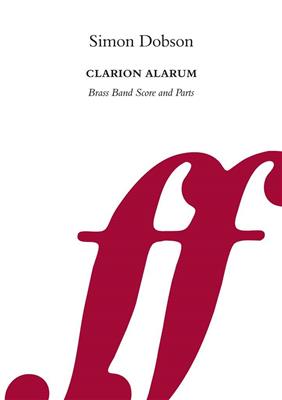Results
-
 £115.60
£115.60Music for Halloween 2 - Roar Minde Fagerli
Music for Halloween 2 is three simple pieces who describes spooky and scary characters we all know from halloween.In The first movement you meet some ghosts. The second movement describes death dancing a waltz. The third movement describes a huge scary monster.Make your own halloween-show combining this with Music for Halloween 1. Make up scary stories to tell before you play a movement. Maby someone can dress up and perform something dramatic while the music is playing.
Estimated dispatch 5-14 working days
-
 £59.99
£59.99Perfect
Pop singer Ed Sheeran continues to dominate the charts, and this romantic ballad from his third album reached No. 1 in sixteen different countries! Here is a sensitive version for band with flowing melodies and nicely varied orchestration.
Estimated dispatch 5-14 working days
-
 £154.60
£154.60Prelude Festivo - John Brakstad
Prelude Festivo is intended to be performed both in concerts and in competitions and includes solo passages for most instrument groups. Duration 7,5 minutes. Form: Fast slow fast. The piece is built on two themes: Theme 1 (Allegro con spirito) is first presented as a cornet solo after a fanfare-like opening. Theme 2 is hinted at in the opening bars, but is presented fully in the slow (Andante) section (bar 141). This theme is developed and also appears as melodic and rhytmic fragments throughout the composition. In the concluding section (bar 196) both themes are played in conjunction before the piece concludes with the fanfare theme from the opening bars. Parts thatare marked piu mosso ed leggiero should be played in a cheerful light staccato style in contrast to Andante cantabile.
Estimated dispatch 5-14 working days
-
 £105.20
£105.20Hello
Hello is a song by English singer Adele. It was released October 2015 as the first single from her third studio album, 25. Adele co-wrote the song with her producer, Greg Kurstin. "Hello" has achived great success wordwide, reaching no. 1 on almost every chart.
Estimated dispatch 5-14 working days
-
£127.30
Beginner's Suite - Øystein Sjøvaag Heimdal
This is a four-part suite written for beginning bands at grade level 1. The four movements are different in character and style, and can be performed as a suite or as single movements.Every part is challenging and the melody are played by various instruments throughout the piece.Several doublings makes itplayable also with a smaller band than the scoring indicate.
Estimated dispatch 5-14 working days
-
 £115.60
£115.60Music and Songs from Captain Sabertooth - Terje Formoe
The first theatre performance with Captain Sabeltann "Captain Sabeltann and the treasure in Kjuttaviga" premiered in Kristiansand Zoo in 1990. It is up to 2015 written even four plays, all of them renewed several times. From its inception until todayit is sold over 1.2 million tickets to Terje Formoe plays.This arrangement concist of three songs from this music; Heksesangen, Livet er herlig and Bursdagssang (Birthday Song)..
Estimated dispatch 5-14 working days
-
 £115.60
£115.60The Super Heroes of the Band - Øystein Sjøvaag Heimdal
You'll find many kinds of super heroes around you. This is a suite presenting the super heroes of the band:1. Low Brass Man2. The Flute Phantom3. Trumpet Lady4. Sgt. Major Minor The short movements can beplayed individually or together as I suite.
Estimated dispatch 5-14 working days
-
 £22.00
£22.00Clarion Alarum - Simon Dobson
Clarion Alarum: Fanfare No.1 for Brass Band is a short fanfare for brass band, contrasting the brilliance of the sound of cornets and trombones with the warmer tones of horns, euphoniums and tubas. BrassBand Grade 5: 1st Section Duration: 2.5 minutes
Estimated dispatch 5-14 working days
-
 £84.99
£84.99Christmas Miniatures - Patrick Millstone
10 famous Christmas songs in different styles. Including: 1. Intrada - Bohemian traditional 2. Quem Pastores Laudavere 3. Once in Royal David's City 4. Song - French traditional 5. Er is een Kindeke geboren op aard' - Dutch traditional 6. Coventry Carol 7. Deck the Halls 8. O, Kindeke klein 9. Good King Wenceslas 10. Traditional from Poland
Estimated dispatch 5-14 working days
-
£84.99
Creamy and Crispy - Marc Cunningham
This composition of Marc Cunningham has four parts, and takes place on a sunny day in a picturesque town. 1. Promenade Many people walk through the city. The band passes through the streets. People are strolling along the avenues and amorous couples are sitting on a park bench. 2. Lovey Dovey One of these couples is knee-deep in love. 3. Crispy and Creamy Here the contrasts between a crisp staccato section in two-four time signature and a smooth legato section in three-four time signature are depicted. Is Crispy the boy and Creamy the girl? 4. Farewell In the last particle the couple says goodbye. We still think back tothe walk through the city. It sounds a little less happy now. Not everyone is good at saying goodbye, sometimes a tear flows.
Estimated dispatch 5-14 working days
